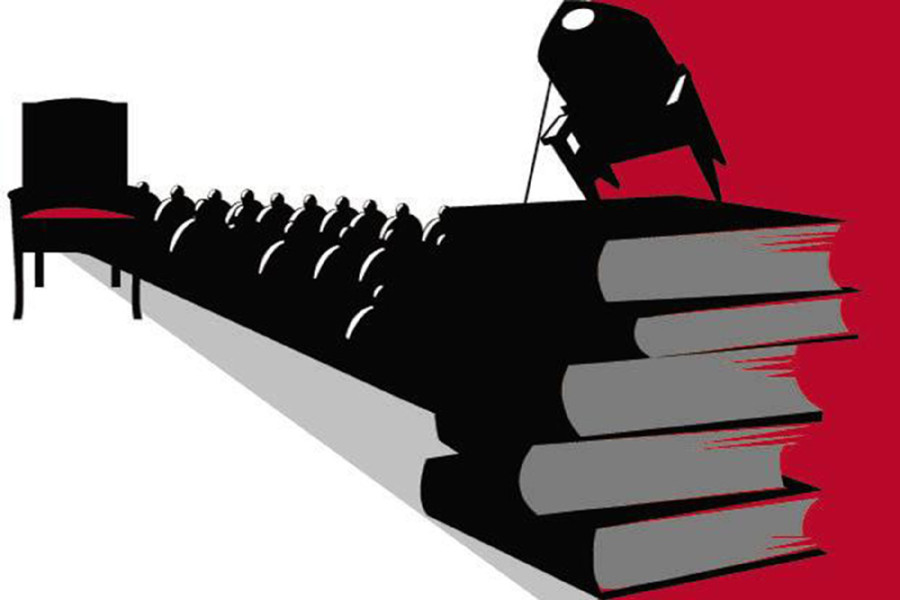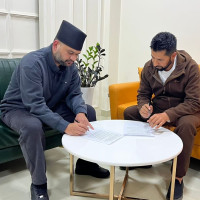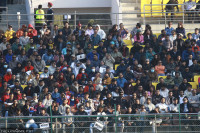Opinion
Where are we headed?
Prachanda and Deuba do not appear to have a plan or the resources to resolve new challenges
Extreme political partisanship has clouded our judgment about the recent political events. Oli has refused to facilitate the transition of power despite knowing too well that he no longer enjoys a majority in Parliament. Rather than resigning, Oli called up the Nepali Congress (NC) leader Sher Bahadur Deuba and Maoist Chairman Pushpa Kamal Dahal to his residence and demanded an explanation. When he did not like it, he issued a threat.
Obviously, he has reasons to be piqued. First, it was the NC that encouraged him to push forward the current constitution at the cost of alienating many. Then it was Prachanda who goaded him to move forward on the path of “bicycle nationalism”. Incidentally, it was Prachanda who pulled the rug out and ushered us into a phase of reversal.
Oli’s current posturing, whether we find it funny or not, has significant implications for our political future. We need to evaluate the current political development with our end goal in mind, which is to embark on a path of development by ending the current political conflict and implementing a new constitution. There are two significant questions. First, was it necessary to remove Oli to achieve these objectives? Second, will Oli’s departure help us achieve them?
Removing Oli
Oli’s politics is a divisive one. It has exacerbated a national divide between the Madhesis and Pahades. The Madhes movement has functioned as an umbrella movement for other resistance groups that had so far refused to be lumped with the Madhesi identity. Oli created a sharp division between those who oppose China and those who oppose India, a foreign policy conundrum that will now take a generation to overcome. On top of that, he embarked on a path of fiscal indiscipline and crony capitalism that fractured relations with its main constitutional partner, the NC.
Extreme politics demands extreme vocabulary, and Oli has contributed to our metaphorical understanding of political processes. But then it only serves to show how the country’s mindset is divided, usually into two binary opposites. The last several months, the popularity of different words in Twitter and Facebook have come to signify the nature of our political conflict. Hanumanji is one, and it usually refers to people who blindly defend Oli, sometimes at the cost of being trapped in self-contradictory statements. It also refers to people who are protesting against Dr Govinda KC. Interestingly, Dr KC’s fast-unto-death has caused a sharp polarisation in the country—you are either “corrupt” or you are “crazy”.
Similarly, power transition in Nepal is now usually associated with charged or depleted “battery” which has replaced earlier terms like “remote control” and “radio transmission”. These terms are related to “bicycle nationalism”, a phrase that came out of Prachanda’s anti-India posturing before his battery of nationalism ran out. If you go to the Madhes, you will frequently hear the phrase, aar-par ko rajniti. You are either on this side or on that side. When it comes to political agreements, they are of two types, cash or credit. As is obvious, the Madhesis are fed up with the credit system.
Moving ahead with Oli’s current policy of nationalism and pushing forward the current constitutional provisions were one option. However, repressing the sentiments of the Madhes and moving forward under conditions of negative peace would have only generated latent conflict. Such conflict would have flared up during the implementation of federal provinces and made future elections difficult. With India supporting the Madhes, such course would have been untenable in the long run, allowing us neither peace nor economic development.
Another option was to change Oli’s politics and make him flexible in accommodating the demands of the Madhesis. However, the most important feature of Oli’s nationalism and anti-India posturing is the refusal to allow greater political powers to the Madhes, whether through demarcation of new provinces or by allowing the provinces to have oversight over local bodies. It was clear that Oli would be willing to appease India, but he would not be willing to let go of his “nationalism.”
The only other political course is to remove Oli and try to see if a compromise can be worked out with the Madhes. The current political transition allows for such a possibility but does not guarantee it.
A new obstacle course
Oli’s dialogue with Deuba and Prachanda has now become famous: “You register a vote of no-confidence. Then you also ask for my resignation. What do you want? Decide.” Resigning and facing the vote of no-confidence, apparently, are two different things. According to Oli, resigning while there is a no-confidence motion in Parliament is unconstitutional. Then there is also the veiled threat that he will not cooperate with them on resolving constitutional deadlocks if he is not allowed to dictate the terms of the current power transition.
Oli is reluctant to believe that his government is in a minority as it has not been proved in Parliament. He is taking up this pet peeve with the Speaker as well as other party leaders. However, in a parliamentary party system, party decisions are significant, and since the NC and Maoists
have officially decided to withdraw their support and informed the PM, there is no doubt that Oli has lost majority in Parliament. In addition, he is trying to raise constitutional questions over the possibility of a change in government.
Even if we surmount that temporary confusion, we will face another challenging prospect. Oli’s departure does not solve Nepal’s problems. In fact, it creates new ones.
Oli will continue to have an upper hand if he remains in control of the UML’s parliamentary party. The single reason is that a constitutional amendment is necessary to fulfil some of the key demands of the Madhes and resolve Nepal’s political conflict. For example, resolving the Madhes conflict will require addressing questions over federal boundaries, provinces’ oversight of local bodies, inclusion, and population-based representation.
Oli can still play the role of a spoiler in resolving political hurdles. First, he can block any attempt at constitutional amendment, as it requires a two-thirds majority. Second, the implementation of the new constitution requires a smooth functioning of Parliament. In order to implement the new constitution, Parliament needs to revise more than 300 laws and enact more than 150 new ones before the transition period expires in January 2018. However, Oli can continue to create hurdles by disrupting parliamentary proceedings.
India’s stance toward Oli is being portrayed as the determining factor in Nepal’s political process. The UML and Oli are trying to rev up the psychology of nationalism to resist regime change. India will be happy at Oli’s departure, although many ministers in recent months had been pushing decisions to please India. India perceived that Oli was using China as a strategy to antagonise it rather than as part of an independent foreign policy. Oli, like Prachanda in the past, will continue to trump up Nepali nationalism and work together with groups on the extreme left and right.
Given these factors, an attempt to amend the constitution will generate a new type of conflict. Prachanda and Deuba do not appear to have a plan or resources to resolve this new conundrum.
The author can be reached at [email protected]




 7.12°C Kathmandu
7.12°C Kathmandu








%20(1).jpg&w=300&height=200)

